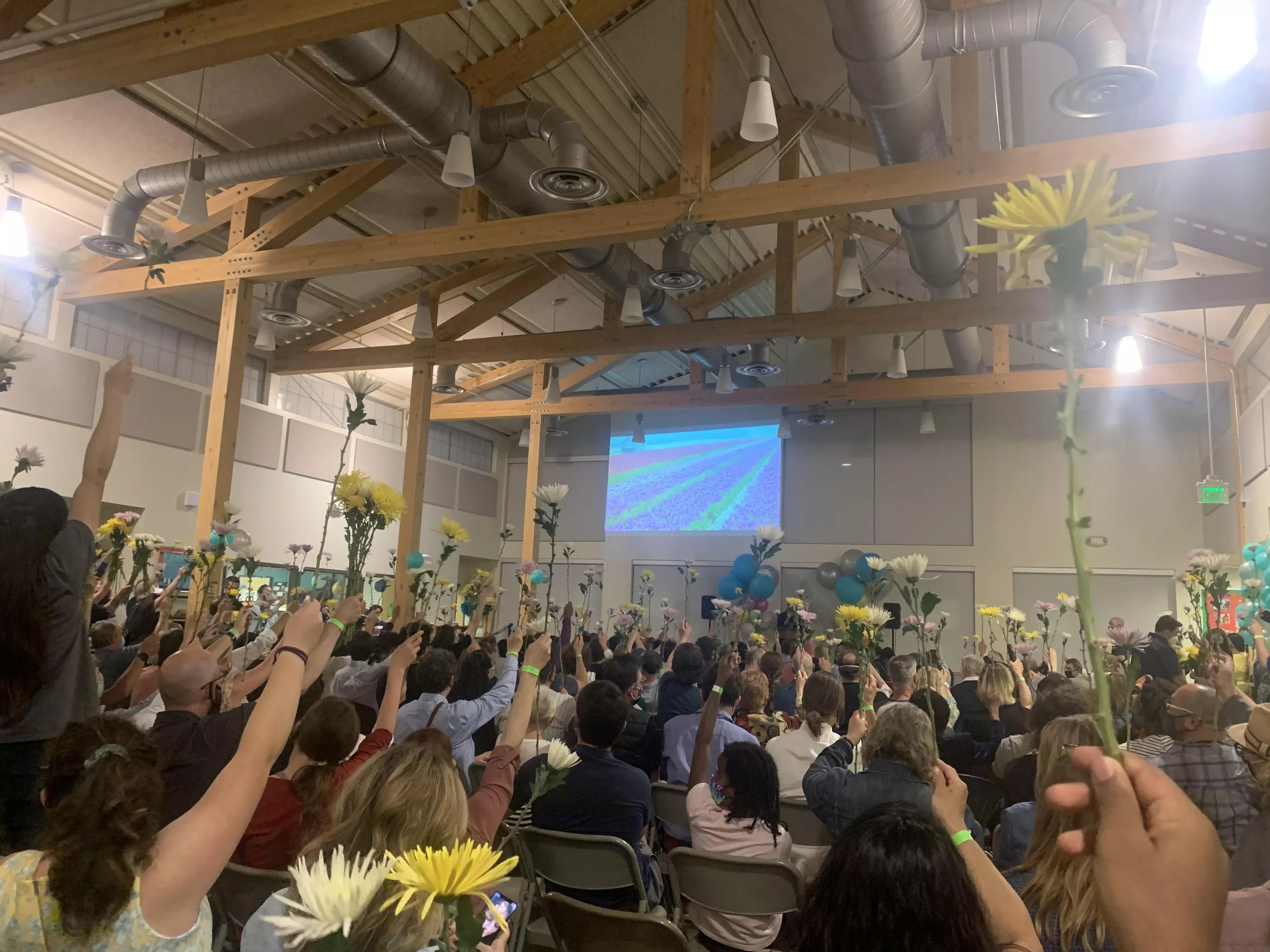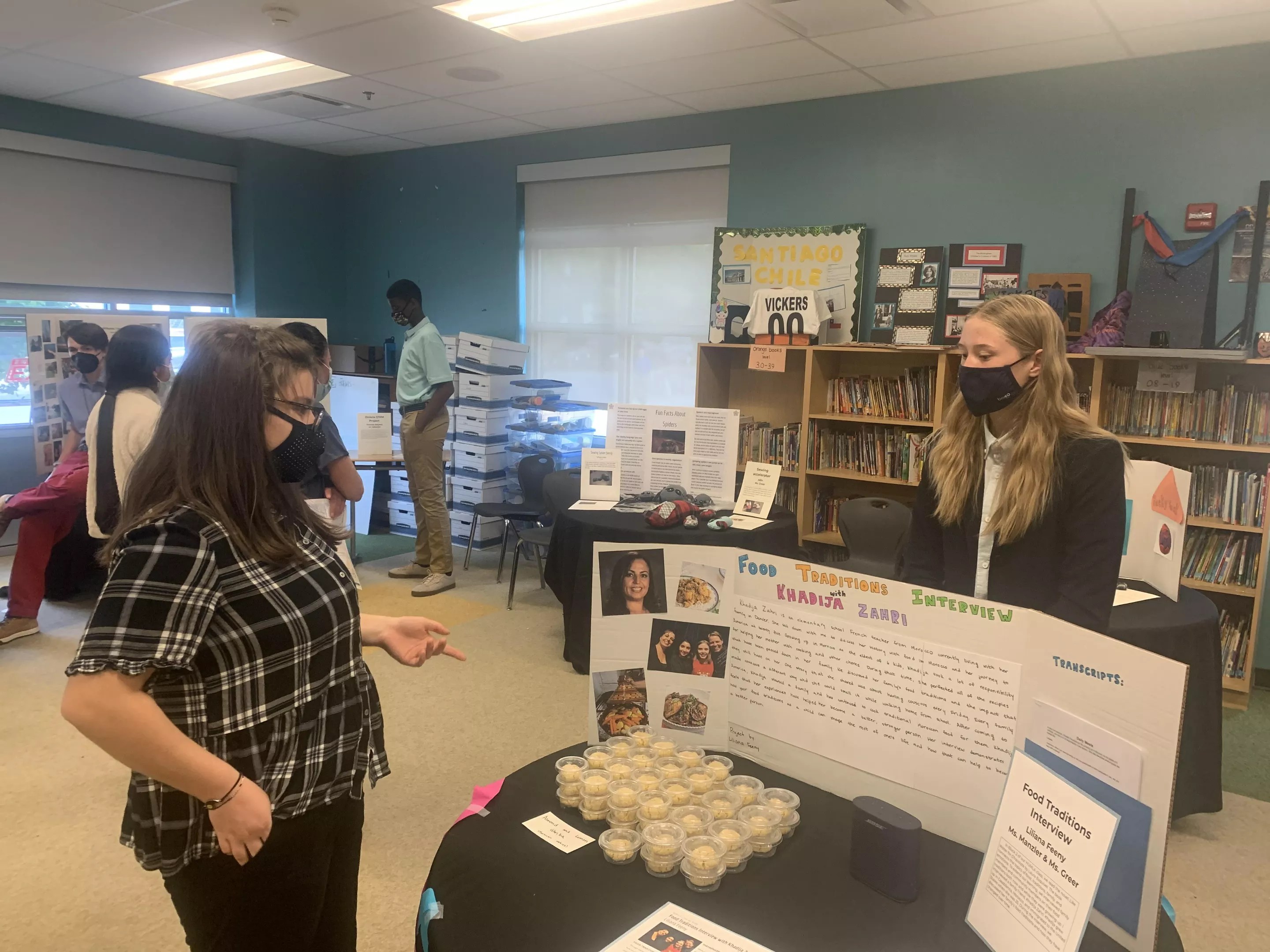
Marianne Manzler

Audio By Carbonatix
During this past school year at The CUBE, teachers Marianne Manzler and Tia Greer assigned high-school students in their eight-week “Food & Society” Humanities class to interview relatives and community members about food memories and culinary traditions, which they turned into short essays that illustrate Denver’s eating habits.
“Students explored the origins of and developments in diverse food traditions,” Manzler explains. “They learned about how the concept of ‘breaking bread,’ or sharing company over a meal, goes back centuries and is one of humanity’s longest shared traditions. This block, students at the CUBE took on the role of a professional journalist as they explored food and its importance to the different communities of Denver and beyond.”
The results of their explorations were shared at CUBEfest, a school event on May 26. It was the last for CUBE: After two years, the school is leaving 3399 Holly Street – in the Boys & Girls Club at the former Holly Square – at the end of the week because of low enrollment and other facility issues.
In the meantime, here’s a taste of the students’ work:

Liliana Feeny describes her work at CUBEfest.
Marianne Manzler
Khadija Zahri, by Liliana Feeny:
Khadija Zahri is an elementary school French teacher from Morocco currently living with her family in Denver. She sat down with me to discuss her history with food in Morocco and her journey to America at twenty five. Growing up in Morocco as the eldest of 6 kids, Khadija took a lot of responsibility for helping her mother with cooking and other chores. During that time, she perfected all of the recipes that have been passed down in her family. We discussed her family’s food traditions and the impact that they still have on her. One story that she shared was about having couscous every Friday. Every family made couscous a different way and she could smell it while walking home from school. After coming to America, Khadija started a family and has continued to cook traditional Morrocan food for them. Khadija feels that her experiences have helped her become a better, stronger person. Her interview demonstrates how your food traditions as a child can shape the rest of one’s life and how that can help to become a better person.
Rebecca Adams, by Aaliyah Adams:
Last week, I interviewed my mom, Rebecca Adams. Mostly for the fact that she’s the main person in my life I look up to, but also because I know that she has an interesting story and mixed culture in our family. I set up my phone and a small table upstairs in the loft once she was done with work so we could have a calm and ready environment to do the interview. One major question I asked her is about the food she grew up with, and what it meant to her and why. The second major question I asked her was who cooked the food. My great grandma. A big story, or main thing that stood out to me that she shared were the ‘treats’ or ‘special meals’ that my mom and her siblings got growing up. My mom told me about a specific brand of pizza that my great grandma would buy mostly on fridays for my mom and everyone else. And it’s funny, she still buys the same brand of pizza for me and my little brother when we go to her house. I learned a lot more than I thought I knew from my mom doing this interview. I think I can say that it was a good experience for the both of us.
Irv and Orah Kaplan, by Alma Kaplan:
Creating food is an art, an art that can be passed down, molded, and cherished. Food is love, and in that love live two grandparents who appreciate and treasure the history of the culinary arts. From brisket to Sunday morning lox and bagels, Irv and Orah Kaplan tell their story from the Jewish American perspective. Most Jewish women didn’t even dare to own a cookbook, yet Orah’s mother used the settlement cookbook to lend her a hand. With a family of butchers, the food must be spectacular: Veal, little smoked fish, and lamb chops. But it doesn’t end at that, kugel and gefilte fish were just as prominent as the classic American meat. In the end, the lesson learned was that while they bicker and they laugh, another string that bonds them is the one of food.
Kelli Daniels, by Christopher Jones:
An interesting human being… Being a chef, she has been through a lot, more than most actually. She was on many different cooking shows, and she was pretty great. She is very precise with her answers, and is always ready to talk. Honestly… Was a little surprised by her outgoingness, and it was enjoyable to hear her answer my questions. She actually didn’t go to culinary school, but after she pursued her dream career! She was very willing to come onto the Zoom to be a part of the interview, and we had a lot of fun talking, and getting to know her better. I asked her a question during the interview: “Do you have anything against fast food; being a chef?” And she said that she doesn’t have anything against fast food, she just thinks that they need to find healthier ways for fast food, that’s why she opened her food truck business.
Dr. Eldridge Greer, by Henry Krieger:
How does food shape a community and community shape food? We asked these questions and others to Dr. Eldridge Greer, an expert on barbecue and the traditions that go with it, to discover more about food, and how it has shaped him as a person. Barbecue is not one set way to cook, there are regional varieties with different meats like pork and beef, and fuels like charcoal or assorted woods (but no gas), all creating a community that comes together to eat as one, with some people supplying barbecue, as well as coleslaw, greens, and traditional mac and cheese. We learned how food can help people create new relationships and strengthen existing ones. People can get an understanding of food as a tradition and barbecue, all thanks to the wonderful experience of talking with Dr. Greer.
Catherine and Russell Wargin, by Tierra Parkinson:
The purpose of Tierra’s interview was to learn about family and food traditions. For example, the kinds of traditions that the interviewee had when they were younger and the traditions and food that they eat and celebrate today. Tierra interviewed Catherine Wargin, and Russell Wargin, her great-grandparents because they both were born and raised in a very different time. Two major questions that she asked were, “How did food impact your home and family when you were a child?” and “Is there a particular comfort food that you like that either your parents or someone in your family cooked for you? If so, what is it?” One major finding that Tierra found during her interview was that Russell grew up during WWII and they had to ration things like food, but during his and his younger sister’s birthday their mother would make them a merry-go-round cake with animal crackers lining the side of it. Another major finding was a tradition, called the Feast of the Seven Fishes, that Catherine and her family celebrated, and that she still celebrates now. Overall, she learned from her interviewees that food can connect family through the generations, and even if you don’t have the most lavish or expensive food and dinner, you still get to eat it with the ones you love.
Read more essays by the CUBE students in their original format here.